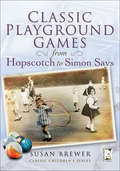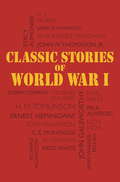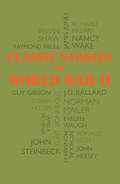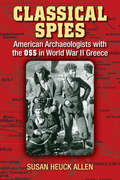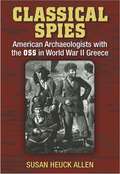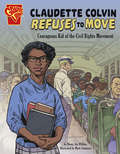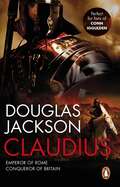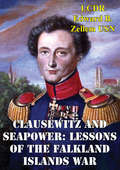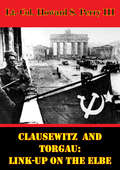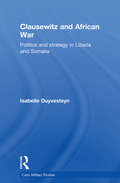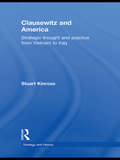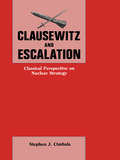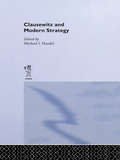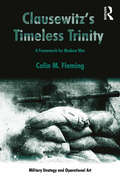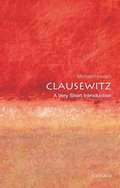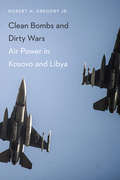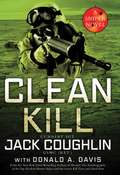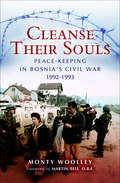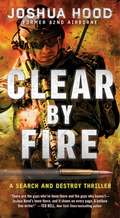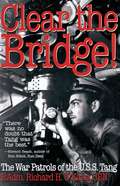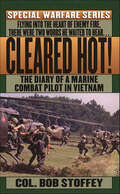- Table View
- List View
Classic Playground Games: From Hopscotch to Simon Says (Classic Children's Series)
by Susan Brewer&“[A] combination of history and meaning behind favorite playground games and the verses . . . virtually guaranteed to make you laugh and sing&” (Fiona Shoop, author of How to Deal in Antiques). This delightful book records favorite childhood games and recalls forgotten rhymes. With more children suffering from obesity, Susan Brewer looks at the social games we used to play from skipping to chase games that used up our energy during recess. Instead of costly computer games, we used rhyming games, played Jacks, and showed our balancing skills during competitive games of hopscotch. A charming book, full of anecdotes and nostalgia for how we remember our favorite place at school—the playground.
Classic Stories of World War I: Tales of the Great War's Most Heroic and Harrowing Experiences
by BountyNot a soul in sight except the sentinels guarding the railways, muffled to the eyes, or peering out of their pine-boughs at the cross roads."Edith Wharton, Coming HomePublished to mark the 100th anniversary of the end of The Great War, Classic Stories of World War I brings together the works of world-class authors, such as Joseph Conrad and W. Somerset Maugham, who lived through the conflict.From the home front to the western front, in the trenches or behind enemy lines, on land or at sea, this collection is a unique insight into the "war to end war."Contents include:JOSEPH CONRAD, The TaleW. SOMERSET MAUGHAM, The Traitor (from Ashenden)ERNEST HEMINGWAY, In Another Country (from Men Without Women)EDITH WHARTON, Coming HomeSTACY AUMONIER, Them OthersJOHN W. THOMASON, JR, War DogGEORGES DUHAMEL, Réchoussat's Christmas (from Civilisation)H. M. THOMLINSON, Armistice (from Waiting for Daylight)C. E. MONTAGUE, Honours Easy (from Fiery Particles)RICHARD ALDINGTON, Introduction to the Trenches (from Death of a Hero)JOHN GALSWORTHY, Defeat (from Six Short Plays)PAUL ALVERDES, The Man in the Next Bed (from The Next Man)LEO V. JACKS, One Hundred Per CentKARL WILKE, Marie-LuiseH. M. Tomlinson, A Raid Night (from Waiting for Daylight)JAMES WARNER BELLAH, FearJAMES B. WHARTON, Among the TrumpetsW. TOWNEND, No QuarterW. F. MORRIS, SouvenirsARED WHITE, The Watch on the Rhine
Classic Stories of World War I: Tales of the Great War's Most Heroic and Harrowing Experiences
by Classic Stories Of World War IA compilation of popular fiction and non-fiction excerpts detailing the heroic and harrowing experiences of the First World War.
Classic Stories of World War II: Tales of History's Most Heroic and Harrowing Experiences
by Bounty"The noise of the explosions died slowly, as though the sound was moving heavily through the draws and along the ridges to collect in other places." Irwin Shaw, The Young LionsAuthentic and impassioned stories of heroism and brutality, starvation and survival, defeats and triumphs from World War Two's most poignant hours. Gripping highlights from the greatest war novels include James Jones' From Here to Eternity, Evelyn Waugh's Officers and Gentlemen, and Joseph Heller's Catch 22. Compelling true-life accounts from around the world include the Battle of Britain from Guy Gibson, VC, the exploits of the French Resistance from Australian Nancy Wake, and a riveting report of Hiroshima by John Hersey.Contents include: IRWIN SHAW A Perfect Morning (from The Young Lions)J.G.BALLARD Lunghua Camp (from Empire of the Sun) JAMES JONES The Big Day (from From Here to Eternity) JAMES A. MICHENER The Landing at Kuralei (from Tales of the South Pacific) RICHARD HILLARY Shall Live for a Ghost? (from The Last Enemy) KURT VONNEGUT Billy Pilgrim (from Slaughterhouse Five) EVELYN WAUGH Battalion in Defence (from Officers and Gentlemen) NORMAN MAILER Anopopei (from The Naked and the Dead) GUYGIBSON, VC Some were Unlucky(from Enemy Coast Ahead) JOSEPH HELLER Major Major Major Major(from Catch 22) RAYMOND PAULL The Invasion of Papua (from Retreat from Kokoda) RONALD SETH Stalingrad- the Story of the Battle (from Stalingrad-Point of Return) NANCY WAKE The White Mouse and the Maquis d'Auvergne (from The White Mouse) JOHN STEINBECK The Invaders (from The Moon is Down) NICHOLAS MONSARRAT The Compass Rose (from The Cruel Sea) JOHN HERSEY Hiroshima - The Fire (from Hiroshima)
Classic Stories of World War II: Tales of History's Most Heroic and Harrowing Experiences
by Classic Stories Of World War IIClassic Stories of World War II is a collection of fiction and non-fiction excerpts from the works of world-class authors who lived through the conflict. Authentic and impassioned stories reveal the heroism, survival, defeat and triumph of one of the most shocking wars this world has ever seen. Contents include: IRWIN SHAW A Perfect Morning (from The Young Lions) J. G. BALLARD Lunghua Camp (from Empire of the Sun) JAMES JONES The Big Day (from From Here to Eternity) JAMES A. MICHENER The Landing at Kuralei (from Tales of the South Pacific) RICHARD HILLARY Shall Live for a Ghost? (from The Last Enemy) KURT VONNEGUT Billy Pilgrim (from Slaughterhouse Five) EVELYN WAUGH Battalion in Defence (from Officers and Gentlemen) NORMAN MAILER Anopopei (from The Naked and the Dead) GUYGIBSON, VC Some were Unlucky(from Enemy Coast Ahead) JOSEPH HELLER Major Major Major Major(from Catch 22) RAYMOND PAULL The Invasion of Papua (from Retreat from Kokoda) RONALD SETH Stalingrad- the Story of the Battle (from Stalingrad-Point of Return) NANCY WAKE The White Mouse and the Maquis d'Auvergne (from The White Mouse) JOHN STEINBECK The Invaders (from The Moon is Down) NICHOLAS MONSARRAT The Compass Rose (from The Cruel Sea) JOHN HERSEY Hiroshima - The Fire (from Hiroshima)
Classical Spies: American Archaeologists with the OSS in World War II Greece
by Susan Heuck Allen"Classical Spies will be a lasting contribution to the discipline and will stimulate further research. Susan Heuck Allen presents to a wide readership a topic of interest that is important and has been neglected. " -William M. Calder III, University of Illinois, Urbana-Champaign. Classical Spies is the first insiders' account of the operations of the American intelligence service in World War II Greece. Initiated by archaeologists in Greece and the eastern Mediterranean, the network drew on scholars' personal contacts and knowledge of languages and terrain. While modern readers might think Indiana Jones is just a fantasy character, Classical Spies discloses events where even Indy would feel at home: burying Athenian dig records in an Egyptian tomb, activating prep-school connections to establish spies code-named Vulture and Chickadee, and organizing parachute drops. Susan Heuck Allen reveals remarkable details about a remarkable group of individuals. Often mistaken for mild-mannered professors and scholars, such archaeologists as Princeton's Rodney Young, Cincinnati's Jack Caskey and Carl Blegen, Yale's Jerry Sperling and Dorothy Cox, and Bryn Mawr's Virginia Grace proved their mettle as effective spies in an intriguing game of cat and mouse with their Nazi counterparts. Relying on interviews with individuals sharing their stories for the first time, previously unpublished secret documents, private diaries and letters, and personal photographs, Classical Spies offers an exciting and personal perspective on the history of World War II"--
Classical Spies: American Archaeologists with the OSS in World War II Greece
by Susan Heuck Allen"Classical Spies will be a lasting contribution to the discipline and will stimulate further research. Susan Heuck Allen presents to a wide readership a topic of interest that is important and has been neglected. " -William M. Calder III, University of Illinois, Urbana-Champaign. Classical Spies is the first insiders' account of the operations of the American intelligence service in World War II Greece. Initiated by archaeologists in Greece and the eastern Mediterranean, the network drew on scholars' personal contacts and knowledge of languages and terrain. While modern readers might think Indiana Jones is just a fantasy character, Classical Spies discloses events where even Indy would feel at home: burying Athenian dig records in an Egyptian tomb, activating prep-school connections to establish spies code-named Vulture and Chickadee, and organizing parachute drops. Susan Heuck Allen reveals remarkable details about a remarkable group of individuals. Often mistaken for mild-mannered professors and scholars, such archaeologists as Princeton's Rodney Young, Cincinnati's Jack Caskey and Carl Blegen, Yale's Jerry Sperling and Dorothy Cox, and Bryn Mawr's Virginia Grace proved their mettle as effective spies in an intriguing game of cat and mouse with their Nazi counterparts. Relying on interviews with individuals sharing their stories for the first time, previously unpublished secret documents, private diaries and letters, and personal photographs,Classical Spies offers an exciting and personal perspective on the history of World War II.
Classical Spies: American Archaeologists with the OSS in World War II Greece
by Susan Heuck Allen“Classical Spies will be a lasting contribution to the discipline and will stimulate further research. Susan Heuck Allen presents to a wide readership a topic of interest that is important and has been neglected.” —William M. Calder III, University of Illinois, Urbana-Champaign Classical Spies is the first insiders’ account of the operations of the American intelligence service in World War II Greece. Initiated by archaeologists in Greece and the eastern Mediterranean, the network drew on scholars’ personal contacts and knowledge of languages and terrain. While modern readers might think Indiana Jones is just a fantasy character, Classical Spies disclosesevents where even Indy would feel at home: burying Athenian dig records in an Egyptian tomb, activating prep-school connections to establish spies code-named Vulture and Chickadee, and organizing parachute drops. Susan Heuck Allen reveals remarkable details about a remarkable group of individuals. Often mistaken for mild-mannered professors and scholars, such archaeologists as University of Pennsylvania’s Rodney Young, Cincinnati’s Jack Caskey and Carl Blegen, Yale’s Jerry Sperling and Dorothy Cox, and Bryn Mawr’s Virginia Grace proved their mettle as effective spies in an intriguing game of cat and mouse with their Nazi counterparts. Relying on interviews with individuals sharing their stories for the first time, previously unpublished secret documents, private diaries and letters, and personal photographs, Classical Spies offers an exciting and personal perspective on the history of World War II.
Claudette Colvin Refuses to Move: Courageous Kid of the Civil Rights Movement (Courageous Kids)
by Ebony Joy WilkinsIt's March 2, 1955, and an ordinary 15-year-old girl from Montgomery, Alabama is about to do something extraordinary. When a white bus driver orders Claudette Colvin to give up her seat for a white passenger, she refuses to move. After Claudette is arrested, her brave actions help inspire Civil Rights leaders organize bus boycotts and perform similar acts to defy segregation laws. Eventually, Claudette's court case results in overturning Alabama's unconstitutional laws and provides greater freedom for black Americans everywhere.
Claudius: An action-packed historical page-turner full of intrigue and suspense…
by Douglas JacksonFrom bestselling author Douglas Jackson, a gripping and visceral novel of the Roman invasion of Britain, for fans of Conn Iggulden and Simon Scarrow."What stands out are Jackson's superb battle scenes. I lost myself in the riveting depictions of combat . . . I was gripped from start to finish." -- Ben Kane. "You will be reading this and saying to yourself, "Just one more page!"..." - ***** Reader review. "THIS is the story I was waiting on!" - ***** Reader review. ********************************************************************EMPEROR OF ROME. CONQUEROR OF BRITAIN. 43 AD. Southern England. Caratacus, war chief of the Britons, watches as the scarlet cloaks of the Roman legions spread across his lands like blood.In Rome, Emperor Claudius desires total conquest and dreams of taking his place in history alongside his illustrious forebears Caesar and Augustus.Among the legions marches Rufus, keeper of the Emperor's elephant. War is coming and the united tribes of Britain will make a desperate stand against the might of Rome in their fight for freedom. The Emperor has a very special purpose for Rufus and his elephant in the midst of the battle - will the Gods favour him?Have you read Caligula - where Rufus's adventures begin?
Clausewitz And Seapower: Lessons Of The Falkland Islands War
by LCDR Edward B. Zellem USNThis paper explores the hypothesis that although Clausewitz has been criticized for not specifically addressing naval warfare in his seminal work On War, Clausewitzian principles are in fact not only applicable, but highly relevant to the modern conduct of war at sea. The 1982 Falkland Islands conflict between Great Britain and Argentina will be used as the framework to examine this hypothesis. As the largest and most significant series of naval engagements since World War II, the Falklands War provides a rich database of both traditional and non-traditional lessons learned about the conduct of war at sea. This paper begins with a brief discussion of critiques of Clausewitz and his apparent lack of focus on the naval element of warfare. It will be followed by a historical review of significant events leading up to, and during the Falkland Islands War. Key events in the war will then be reviewed and examined within a framework of Clausewitzian principles. The motives, key assumptions, military strategy, and tactics of Great Britain and Argentina will be discussed within the context of the Clausewitzian dictum that war is the continuation of politics by other means. Selected specific events in the campaign will then be addressed in terms of Clausewitzian principles of war to determine their relevance or irrelevance to modern naval strategy and campaigning.
Clausewitz And Torgau: Link-Up On The Elbe
by Lt. Col. Howard S. Perry IIIThere has been a great deal of speculation and questions raised as to why the United States and the Western Allies allowed the Soviets to capture the Nazi capital of Berlin. This study will address a number of reasons why the U.S. did not challenge the Soviets for Berlin. In prosecuting World War II, the Soviets never forgot Clausewitz's dictum that war is a continuation of politics by other means. Stalin, who was determined to liberate every East European capital, suspected that the Allies might try a headlong rush to Berlin in April and May 1945. He therefore decided to take diplomatic and military steps to make sure the Allies would not participate in the capture of the German capital. Recent translated material made available through glasnost, provides evidence that the top USSR priority in the closing days of WWII in Europe was to block the Allied advance to Berlin and only then systematically take the city of Berlin.
Clausewitz and African War: Politics and Strategy in Liberia and Somalia (Cass Military Studies)
by Isabelle DuyvesteynOil, diamonds, timber, food aid - just some of the suggestions put forward as explanations for African wars in the past decade. Another set of suggestions focuses on ethnic and clan considerations. These economic and ethnic or clan explanations contend that wars are specifically not fought by states for political interests with mainly conventi
Clausewitz and America: Strategic Thought and Practice from Vietnam to Iraq (Strategy and History #Vol. 23)
by Stuart KinrossThis book demonstrates how Clausewitzian thought influenced American strategic thinking between the Vietnam War and the current conflict in Iraq. Carl von Clausewitz's thought played a part in the process of military reform and the transition in US policy that took place after the Vietnam War. By the time of the 1991 Gulf War, American policy makers demonstrated that they understood the Clausewitzian notion of utilizing military force to fulfil a clear political objective. The US armed forces bridged the operational and strategic levels during that conflict in accordance with Clausewitz’s conviction that war plans should be tailored to fulfil a political objective. With the end of the Cold War, and an increasing predilection for technological solutions, American policy makers and the military moved away from Clausewitz. It was only the events of 11 September 2001 that reminded Americans of his intrinsic value. However, while many aspects of the ‘War on Terror’ and the conflict in Iraq can be accommodated within the Clausewitzian paradigm, the lack of a clear policy for countering insurgency in Iraq suggests that the US may have returned full circle to the flawed strategic approach evident in Vietnam. Clausewitz and America will be of great interest to students of strategy, military history, international security and US politics.
Clausewitz and Escalation: Classical Perspective on Nuclear Strategy
by Stephen J. CimbalaPublished in 1991, Clausewitz and Escalation is a valuable contribution to the field of Military & Strategic Studies.
Clausewitz and Modern Strategy
by Michael I. HandelPublished in 1996, Clausewitz and Modern Strategy is a valuable contribution to the field of Military & Strategic Studies.
Clausewitz's Timeless Trinity: A Framework For Modern War (Military Strategy and Operational Art)
by Colin M. FlemingThis is the first book to apply the Clausewitzian Trinity of 'passion, chance, and reason' to the experience of real war. It explores the depth and validity of the concept against the conflicts of former Yugoslavia - wars thought to epitomise a post-Clausewitzian age. In doing so it demonstrates the timeless message of the Trinity, but also ties the Trinitarian idea back into Clausewitz's political argument. Intended to build on the existing corpus of scholarship, this book differs from the existing literature in two ways. By applying the Trinity to the wars of former Yugoslavia 1991-1995, it explores war at its micro-foundations, assessing the complex cause-and-effect nexus of reciprocity produced by actions between belligerents embroiled in dynamic competition perpetuated by their own interaction. Providing valuable insights into the complexities of real war fuelled by passion, undermined by chance, and shaped by reason, it is the first study to bridge the Clausewitzian world of theory with real experience. Examining each part of the triad separately, the book explores the multiple manifestations of hostility and chance, before then assessing the influence of these elements on the policies of the belligerents as the war evolved.
Clausewitz: A Very Short Introduction
by Michael HowardKarl von Clausewitz (1780-1831) is considered by many to have been one of the greatest writers on war. His study On War was described by the American strategic thinker Bernard Brodie as "not simply the greatest, but the only great book about war." It is hard to disagree. Even though he wrote his only major work at a time when the range of firearms was fifty yards, much of what he had to say remains relevant today. Michael Howard explains Clausewitz's ideas in terms both of his experiences as a professional soldier in the Napoleonic Wars, and of the intellectual background of his time.
Clean Bombs and Dirty Wars: Air Power in Kosovo and Libya
by Robert H Gregory Jr.After the United States, along with NATO allies, bombed the Serbian forces of Slobodan Milosevic for seventy-eight days in 1999, Milosevic withdrew his army from Kosovo. With no troops on the ground, political and military leaders congratulated themselves on the success of Operation Allied Force, considered to be the first military victory won through the use of strategic air power alone. This apparent triumph motivated military and political leaders to embrace a policy of using “clean bombs” (precision munitions and air strikes)—without a dirty ground war—as the preferred choice for answering military aggression. Ten years later it inspired a similar air campaign against Muammar Gaddafi’s forces in Libya as a groundswell of protests erupted into revolution.Clean Bombs and Dirty Wars offers a fresh perspective on the role, relevance, and effectiveness of air power in contemporary warfare, including an exploration of the political motivations for its use as well as a candid examination of air-to-ground targeting processes. Using recently declassified materials from the William J. Clinton Presidential Library along with primary evidence culled from social media posted during the Arab Spring, Robert H. Gregory Jr. shows that the argument that air power eliminates the necessity for boots on the ground is an artificial and illusory claim.
Clean Kill (Sniper Series #3)
by Jack Coughlin Donald A. DavisOn the heels of the New York Times bestselling Kill Zone and Dead Shot comes the most thrilling installment of the Kyle Swanson sniper saga yet. An attempt at peace in the Middle East is brutally shattered. Only Swanson can find out who is responsible, and why, before the world plunges into war. At an ancient castle in Scotland, Sir Geoffrey Cornwell is brokering an unprecedented peace agreement. Prince Abdullah of Saudi Arabia and the Israeli foreign minister are ready to sign a historic treaty--until their meeting is crushed by a missile strike that leaves the foreign minister of Israel dead and the prince wounded. Gunnery Sergeant Kyle Swanson is running covert missions in the mountains of Pakistan when he's called to the United Kingdom, and he arrives just as there is a follow-up terrorist attempt to kill the prince. The attackers aren't working for Al Qaeda--they are employed by foreign operatives determined to overthrow the government of Saudi Arabia and take the Saudi oil reserves by whatever means necessary. Meanwhile, out of hiding comes Juba, one of the most dangerous terrorists in the world. Juba is determined to exact revenge on his nemesis Swanson, who nearly took his life. With scenes of tremendous suspense that span the globe, Clean Kill puts Kyle Swanson in the sights of a group whose greed and vengeance have no limits. That ruthless ambition, however, also brings them into Swanson's sights, which is the wrong place to be.
Cleanse Their Souls: Peace-Keeping in Bosnia's Civil War, 1992–1993
by Monty WoolleyA memoir of the lethal conflict in the former Yugoslavia, by a British soldier who was on the front lines. This is a young cavalry lieutenant&’s moving and shocking account of front line service in the cauldron of war. His troop of Scimitar light-armored vehicles was attached to the 1 CHESHIRE Battle Group, under the charismatic command of Colonel Bob Stewart. Fresh from Germany, he and his men found themselves in a highly political and lethally dangerous civil war. They witnessed appalling atrocities and human tragedy on a giant scale. Yet both soldiers and civilians showed massive courage and resilience. Thanks to the author's diary, we have here an extraordinary, spontaneous, and important account of British troops performing vital military and humanitarian tasks, described by war correspondent and MP Martin Bell as &“earning its place among the impartial narratives of the Bosnian War.&”
Clear The Tracks! The Story of an Old-Time Locomotive Engineer
by Page Cooper Joseph BromleyEmbark on a thrilling journey through the golden age of railroading with Joseph Bromley's Clear The Tracks! The Story of an Old-Time Locomotive Engineer. This engaging memoir offers an intimate and vivid portrait of the life and times of a locomotive engineer during the heyday of steam engines, capturing the essence of a bygone era when railroads were the lifeblood of America.Bromley, drawing from his own experiences and those of his fellow engineers, provides a firsthand account of the challenges, triumphs, and adventures encountered on the rails. From the thundering roar of powerful locomotives to the camaraderie and grit of the railroad men, readers will be transported to a world where skill, bravery, and determination were essential to keep the trains running on time.The book delves into the technical aspects of locomotive operation, offering fascinating insights into the machinery, engineering feats, and innovations that revolutionized transportation. Bromley's storytelling is rich with anecdotes and personal reflections, giving a human face to the hardworking individuals who dedicated their lives to the railroads.Clear The Tracks! is more than just a historical account; it is a tribute to the spirit of adventure and the enduring legacy of the railroad industry. Whether you're a railroad enthusiast, history buff, or simply someone who loves a good story, Bromley's memoir is sure to captivate and inspire. Experience the romance and ruggedness of old-time railroading through the eyes of a seasoned engineer who lived it all.
Clear by Fire: A Search and Destroy Thriller (Search and Destroy Thriller #1)
by Joshua HoodInspired by the experiences of a decorated combat veteran and a former member of the 82nd Airborne Division, Clear by Fire is a blistering debut military thriller about an American hero who, in order to clear his name, must take down a team of black ops soldiers that have gone murderously rogue.Mason Kane was once a loyal American soldier and a proud member of the elite, off-the-books Anvil Program—a group of black ops soldiers who wage war from the shadows. But all that changed when his commander, as a part of a twisted scheme to force America’s continued involvement in the Middle East, ordered an innocent Afghan family murdered. Refusing the direct order, Mason now finds himself on the run, hunted by his former comrades and labeled a terrorist by the country he faithfully served. Relying only on his survival skills and the help of Special Operations agent Renee Hart, Mason must embark on his gravest mission yet: unraveling a conspiracy that reaches all way to the President’s inner circle, and stopping the world’s most dangerous soldiers from completing their treacherous plan.
Clear the Bridge!: The War Patrols of the U.S.S. Tang
by Richard O'KaneTang carried the war to the enemy with unparalleled ferocity. This is her story as told by her skipper.From the Trade Paperback edition.
Cleared Hot!: The Diary of a Marine Combat Pilot in Vietnam
by Bob StoffeyFull of vivid detail, this combat diary uncovers the real heroes of the Vietnam War, the behind-the-scenes Marine Corps pilots who helped our boys return home...then went back for more.Daring missions. Dangerous rescues. Deadly accuracy.Many pilots never made it out of 'Nam. This one did. Highly decorated Col. Bob Stoffey-- a Marine Corps pilot for over twenty-five years, who served multiple tours in Vietnam-- has seen and done it all. Cleared Hot! is his story-- a fast-paced, high-casualty flight into heart-stopping danger.Includes eight pages of heroic photographs!
